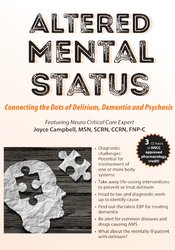

Attention Health Care Professionals!! You play a vital role in identifying and assisting with resolution of problems affecting patients with altered mental status. The patient that you treat for altered mental status may be the life you save.
Delirium… Dementia… Psychosis
When facing a patient with altered mental status, no doubt you have caught yourself saying, “What is going on?” It is time to STOP, LISTEN, LOOK and ACT. This seminar dissects altered mental status (AMS), to identify the problem and lead the way to problem resolution. The study of AMS is like taking a combination med-surg and neuropsychiatric course, as one must look at all body systems when evaluating potential causes of AMS.
Every day, patients present with altered mental status in a variety of settings….ED, ICU, med/surg, geriatric, psych units, rehab, long-term care. The list goes on! Connecting the dots and identifying the problem may be life saving for the patient. You will leave with new assessment tools and strategies to alter the course for your patient experiencing an altered mental status condition.
This online program is worth 6.25 hours CPD.
| File type | File name | Number of pages | |
|---|---|---|---|
| Manual ZNM077450 (3.12 MB) | 79 Pages | Available after Purchase |
Joyce Campbell, MSN, CCRN, SCRN, FNP-BC, has been involved in the nursing field for 35 years. For over 25 years, she taught in an associate degree nursing program where her primary focus was the theory and clinical instruction of neuroscience nursing. In addition to teaching, she has been employed by Comprehensive Health System in Chattanooga, Tennessee for the past 30 years. At Erlanger, she has adopted many roles, including neurosurgical and trauma critical care staff nurse, educator and nurse practitioner. Currently, she serves on the neuroservice line committee and provides stroke education to staff and patients. Erlanger Southeast Regional Stroke Center, an accredited Primary Stroke Center, houses a leading-edge stroke care facility serving over 2000 stroke patients annually.
Through her work at Erlanger, Joyce is able to experience, first hand, the latest innovative strategies for extending the window of treatment for stroke patients. She holds a BSN from East Tennessee State University, an MSN from the University of Tennessee at Knoxville, and completed post-graduate studies at the University of Alabama at Birmingham. Joyce is an active member of the American Association of Critical Care Nurses, the American Association of Neuroscience Nurses, American Association of Nurse Practitioners, and the Chattanooga Association of Nurses in Advanced Practice, where she has served as president and is a member of the educational committee.
Speaker Disclosures:
Financial: Joyce Campbell has an employment relationship with Erlanger Southeast Regional Stroke Center. She receives a speaking honorarium from PESI, Inc. She has no relevant financial relationships with ineligible organizations.
Non-financial: Joyce Campbell is a member of the educational committee for the Chattanooga Association of Nurses in Advanced Practice.
Life-Threatening Causes of AMS: Prepare to Intervene
Common Conditions Causing Delirium
10 Life-Threatening Conditions Causing Delirium
Delirium: Don’t Forget These Possibilities:
Psychosis: Into Madness
Dementia: The Work-Up
Interventions for the Common Problems
Expanding the Window of Care: Current Research
Satisfaction Guarantee
Your satisfaction is our goal and our guarantee. Concerns should be addressed to info@pesi.co.uk or call 01235847393.
Please wait ...